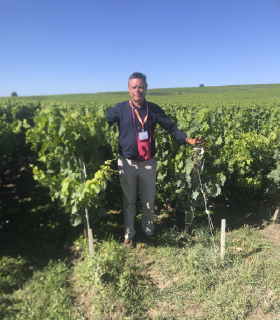Assistant Professor at Faculdade de Ciências da Universidade do Porto (Portugal).
Researcher in GreenUPorto, Sustainable Agrifood Production Research Centre, is principally involved in studies about Training Systems of Vines, Mountain Viticulture, Wine Production, Fortified Wines and Wine Tourism.
He was President of the Organization Committee of the “18th International Symposium GiESCO 2013” and had been member of Organization and Scientific Committees of several national and international congress.
He is Director of the Master in Viticulture and Oenology (FCUP) involving the University of Porto and the University of Lisbon; is Director (University of Porto) of the Erasmus Mundus Joint Master Degree Wine Tourism Innovation – Wintour involving the University of Porto, University of Rovira i Virgili and the University of Bordeaux and is involved in the Euro Master Vinifera connecting several universities from Spain, France, Germany and Italy.
He is Tutor of several PhD and Master Thesis and have experience in coordination of National and International Projects.
He is involved in several national and international projects and had published several papers in international and national magazines, and in proceedings of congress.
Additionally, he is grape and wine producer in the Douro Valley.

Abstract
GENERAL PRESENTATION OF THE MANUAL OF SUSTAINABILITY IN THE DOURO WINE REGION
Jorge Queiroz1*, Joaquim Esteves-da-Silva2, Teresa Mota1, Conceição Santos3
1 GreenUPorto – Sustainable Agrifood Production Research Centre / Inov4Agro, DGAOT, Faculty of Sciences of University of Porto, Campus de Vairão, Rua da Agrária, 747, 4485-646 Vairão, Portugal
2 Chemistry Research Unit (CIQUP), Institute of Molecular Sciences (IMS), Department of Geosciences, Environment and Territorial Planning, Faculty of Sciences, University of Porto, Rua do Campo Alegre s/n, 4169-007 Porto, Portugal
3 IB2 Lab, Department of Biology & LAQV/REQUIMTE, Faculty of Sciences, Rua do Campo, Alegre, University of Porto, 4169-007 Porto, Portugal
*Presenting author: jqueiroz@fc.up.pt
The Demarcated Douro Region (DDR) with a total area of 250,000 ha of which 43,845 ha planted with vines, was responsible for the sale of EUR 623.4 million (IVDP, 2022). With centuries-old viticulture, the Douro is the oldest Demarcated and Regulated Region in the world, (1756, Marquês de Pombal). Considering that grape and wine production in the Demarcated Douro Region has to adapt to climate change (with dramatic effects on the 2022 vegetative cycle), the Douro is a region that is almost totally dependent on the viticulture sector, that has the responsibility of a “Cultural Heritage of Humanity” classification by UNESCO, has a winegrowing industry that was sustainable over centuries, it became necessary to create a document, based on scientific and technical knowledge, that would enable each player in the region (winegrower, viticulturist or winemaker) to assess their degree of sustainability in the region’s production chain. Based on these assumptions, the IVDP decided, in collaboration with the Faculty of Science of the University of Porto, to draw up a “Manual de Sustentabilidade da Região do Douro Vinhateiro” (Winegrowing Douro Region Sustainability Manual) that would be adequate to the unique characteristics of the region. The “Manual”, which is presented, was produced by a multidisciplinary team from the University of Porto in collaboration with the IVDP. Two Focus Groups were set up for discussion, made up of members of Independent Institutions and Entities in the Vitiviniculture Sector and members of Business Associations in the DDR. In its elaboration the following factors were taken into account: (a) most of the ancestral vitiviniculture practices in the DDR are sustainable; (b) the development of the DDR has to go through strategies aligned with the United Nations Sustainable Development Goals (UN-SDGs), and with the European Ecological Pact; (c) be aligned with OIV-CST Resolutions 518-2016 (General principles of sustainable viticulture) and OIV-VITI 641-2020 (Guide for the implementation of the principles of sustainable viticulture) (d) the Manual has to be based on existing scientific technical knowledge. In this way, a Manual was prepared in an educational manner to enable economic operators in the DDR to assess their current level of sustainability, as well as to acquire knowledge that will enable them to increase their sustainability, always taking into account the specific characteristics of the Demarcated Douro Region.
